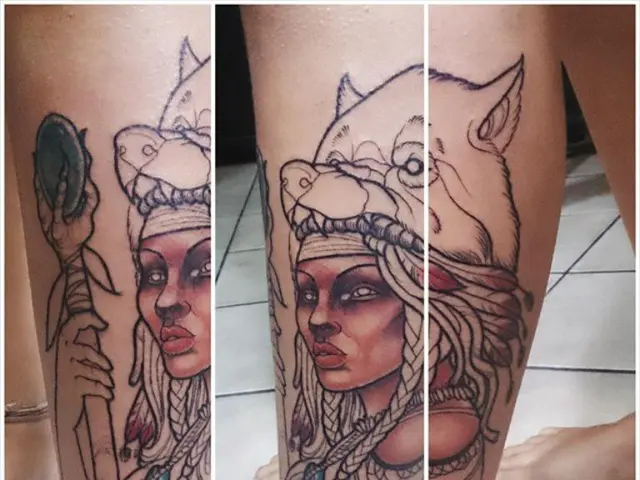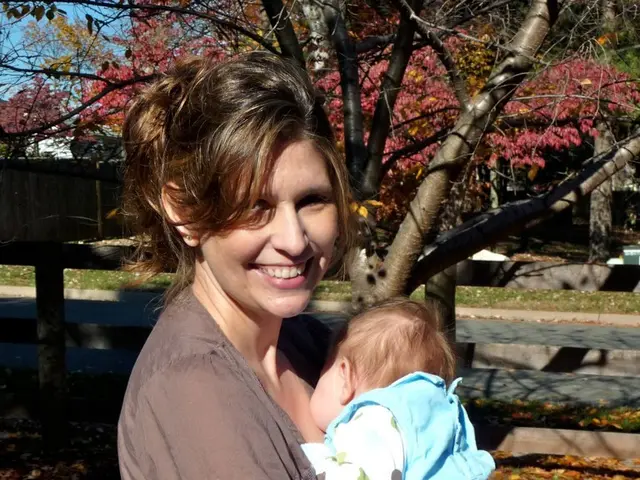Empowerment of Young Females: Jessica Brown's Warrior Woman Foundation Aids Female Adolescents
Laidback Interview with Jessica Brown, Founder of Warrior Woman Foundation
Hey there! It's a pleasure to have Jessica Brown, the fiery and inspiring founder of the Warrior Woman Foundation, on our Virtual Coffee Break. Jessica's journey started as a high school teacher in Western Sydney, where she witnessed the heartaches of young ladies in out-of-home care.
Driven by a burning desire to make a difference, she established the Warrior Woman Foundation in 2020. This fabulous organization supports these brave young women as they navigate their way into adulthood. Through tailored programs advocating for financial literacy, healthy relationships, and mental health, Jessica and her crew up the ante on providing essential support and empowerment.
Jessica, let's start by delving into the moment you decided to launch the Warrior Woman Foundation. What spurred you on this crusade?
As a high school teacher in Western Sydney, I was constantly confronted by young women and girls slipping through the education and welfare systems' cracks. Teaching young ladies who had grown up in out-of-home-care was heart-wrenching, as they were among the most vulnerable students in my care and at the highest risk of unfavorable life outcomes.
According to Create Foundation data, young women who have spent time in care are ten times more likely to have their children removed and placed in care themselves.
My initial program, Sister2Sister, provided mentoring and facilitated the Life Changing Experiences program for young women. This program focused on helping these women change the trajectory of their lives and reach their true potential.
The tragedy of my brother's murder by a young man who had spent time in care magnified my conviction that young people leaving care needed support, skills, and knowledge to lead safe, secure, and independent lives as adults.
The Warrior Woman Foundation, founded in 2020, aims to deliver a comprehensive program for young women leaving care, incorporating: financial literacy, money management, healthy relationships, identifying abuse, sexual health, mental health, help-seeking behavior, employment, and housing security. This program is grounded in Self-Determination Theory.
With a focus on empowering vulnerable young women, what unique challenges do these women face, and how does your foundation address them?
The Warrior Woman Foundation zeroes in on young women leaving the out-of-home-care system at the age of 21—the date at which all government-based support ceases in NSW. The loss of this safety net is amplified for these women who have endured trauma, abuse, low educational attainment, poor mental health, high rates of teen pregnancy, and high rates of substance abuse.
Young women leaving care make up some of the most vulnerable, marginalized, and traumatized groups in Australian society. Each year, over 1500 young women leave care on, or before, their 21st birthday.
Within 12 months of leaving care, approximately 50% of young women end up without jobs, in jail, homeless, or pregnant.
These young women exiting care don't have the option to resort to their parents when they encounter financial difficulties, secure safe housing, or require emotional support. These young women are at risk of becoming pregnant, making up to 28% of all young mothers, who are ten times more likely to have their own children removed, perpetuating the generational cycle of trauma, abuse, marginalization, and disadvantage.
Addressing these "revolving-door" issues is vital for ensuring a brighter future for the current generation of young women leaving care and generations to come. Prevention of unemployment, imprisonment, homelessness, and pregnancy calls for economic empowerment, including financial literacy, employment support, peer work, and mentoring.
I heard that the Warrior Woman Foundation empowers through education, mentoring, and more. Can you share a story that resonates deeply with you?
Kaylah's story deeply resonates with me:
My caseworker suggested that I enroll in the Young Warrior Woman Program to equip myself with the skills required to live independently. It was an incredible program where I met other young ladies like me who were coping with similar issues. The program provided exactly what I needed to build the confidence to believe in myself and set goals for the future. I was paired with a fantastic mentor who listened to my problems and helped me land a part-time job. Our weekly Zoom catch-ups were immensely beneficial for my mental health. I gained knowledge on taxes, spending, and saving wisely, thanks to the money management course. As a result of my mentor's unwavering support, I'm now enrolled in TAFE to start the process of finishing school and pursue a career as an early childhood teacher. I have learned important skills for independence and can confidently say that I will be able to stand on my feet when I finally move out on my own. I'm finally proud of myself. Even though the program is over, my mentor continues to call me, and I have made lifelong friends during the program. I've urged other young ladies in the same position as me to seek help, informing them about this program and its benefits. I have no idea where I would be if I hadn't joined the Young Warrior Woman Program.
Safety concerns are significant for women in Sydney, as highlighted by recent reports. Can you shed light on the aspect of your foundation that focuses on making young women feel safer in their daily lives?
Safety is an ongoing concern for women and girls in NSW. The Warrior Woman Foundation contributes to young women's safety by providing education, skills, and support to identify and prevent abuse.
Our Young Warrior Woman Program includes DV Moving Forward—an evidence-based partner course designed to provide young women with specific knowledge and skills to deal with abuse and coercion.
This program empowers young women to develop an understanding of their rights and how to identify healthy relationships moving forward. The MoneyGirl program is also critical, as it educates young women on financial abuse and fosters financial literacy and money management skills, allowing them to independently manage their finances.
You have worked with many young women dealing with the repercussions of family violence. Could you discuss the integration of trauma healing in your support programs?
The Warrior Woman Foundation takes a trauma-informed approach to all aspects of the Young Warrior Woman Program. All staff members and mentors undergo training in trauma-informed care, ensuring they are equipped with the skills and knowledge to provide support to young women dealing with complex trauma.
Healing from trauma is integrated into the program through courses like DV Moving Forward, as well as through group workshops where participants and mentors work together to share experiences, form healthy friendships, and engage in individual therapy.
The transition from adolescence to adulthood can be difficult. How does your foundation's support programs make this transition easier and more confident for young women?
Mentoring lies at the heart of the Young Warrior Woman Program. Every young woman who participates in the program receives a six-month one-on-one mentoring relationship with a mentor—a woman with life experience and mentoring training.
Working closely with her mentor, each participant receives dedicated guidance to land a job, secure safe housing, build healthy relationships, network, and seek help for mental illness. This ongoing support helps build the participant's confidence to set and achieve goals and tackle any issues they face.
Mentors utilize their life experiences to guide participants through the transition from adolescence into adulthood, ultimately bolstering their confidence and self-esteem, ensuring they reach their full potential.
In light of increasing vulnerability among women, especially in urban areas, what changes would you like to see at the community or governmental level to enhance women's safety and well-being?
At a community level, I would like to see a shift in attitudes towards women and the impact of violence against women. Historically, violence against women has been viewed as a women's issue rather than a whole-of-community issue. To improve women's safety and wellbeing, everyone in the community must accept responsibility for cultivating a safe environment for women and girls.
At a government level, I commend the increased investment in domestic and family violence services. This investment must include a range of services, including those aimed at supporting perpetrators in changing their behavior. Ongoing funding must extend for decades to influence attitudinal and behavioral changes at a community level.
Now, for someone interested in supporting or getting involved with the Warrior Woman Foundation, what options are available to make a meaningful impact?
Individuals can make a meaningful impact by embracing a variety of roles within the Warrior Woman Foundation. They can become mentors for the Young Warrior Woman Program and provide one-on-one support to program participants. Members of the community, organizations, and corporations can contribute as donors or sponsors to the organization.
Donors and sponsors play an essential role by ensuring a diverse income for the organization, allowing it to maintain its independence from grant-based funding. The Warrior Woman Foundation welcomes sponsorship for the Young Warrior Woman Program, as well as the Warrior Woman Alumni, which provides ongoing support for participants beyond the program.
Through the Alumni, participants maintain contact with mentors, peers, and continue to participate in learning opportunities. Learn more about donating your time or funds at warriorwoman.org.au.
- The Warrior Woman Foundation, in its endeavor to empower young women, recognizes the importance of addressing mental health, as these individuals often face challenges such as low educational attainment, poor mental health, and high rates of trauma.
- As part of their comprehensive program, the Warrior Woman Foundation integrates mental health support, help-seeking behavior, and self-determination theory to help young women leaving care overcome obstacles and lead secure, safe, and independent lives as adults.








